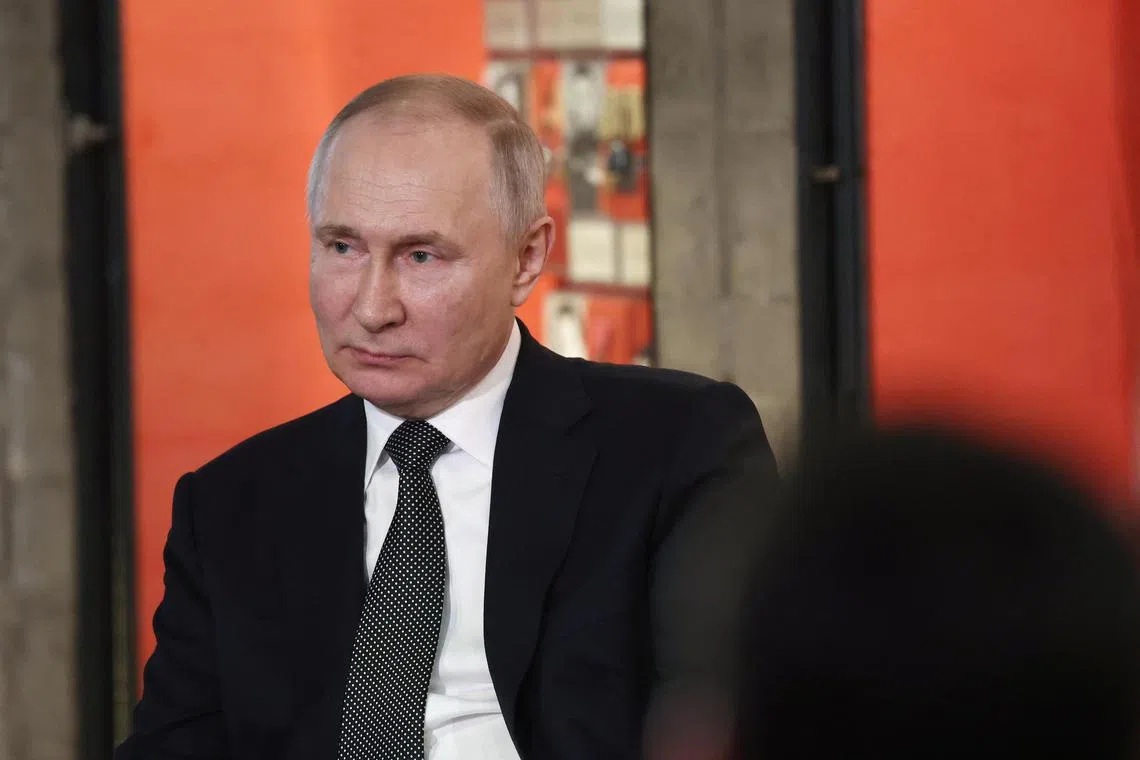Putin promises victory in Ukraine as forces strike key city
Sign up now: Get ST's newsletters delivered to your inbox

Mr Vladimir Putin lashed out again at Western nations, which are sending increasingly advanced weapons to Ukraine.
PHOTO: REUTERS
MOSCOW - Casting his war in Ukraine as a virtuous fight despite mounting deaths and his forces’ plodding progress, President Vladimir Putin vowed on Thursday that Russia would prevail, using a speech in the city formerly known as Stalingrad to compare his invasion to the Soviets’ defeat of the Nazis in a decisive World War II battle.
“The legacy of generations, values and traditions – this is all what makes Russia different, what makes us strong and confident in ourselves, in our righteousness and in our victory,” Mr Putin said.
The Russian leader’s defiant remarks came as Ukrainian officials warned that Moscow was opening a new offensive aimed at capturing more of eastern Ukraine and giving Mr Putin his first significant battlefield success in months. Hours before he spoke, Russian missiles struck the eastern Ukrainian city of Kramatorsk,
Russia’s slow gains in the east and its attempts to capture the nearby city of Bakhmut have come at a huge cost in lives, Ukraine says, as the Kremlin throws thousands of often inexperienced fighters into brutal ground combat against dug-in Ukrainian forces.
But there was no mention in Mr Putin’s speech of Russia’s mounting losses.
Instead, speaking at a “celebratory concert” marking the 80th anniversary of the Soviet triumph in Stalingrad, now known as Volgograd, Mr Putin lashed out again at Western nations, which are sending increasingly advanced weapons to Ukraine. He made his most direct remarks yet in response to Germany’s recent decision to provide Ukraine with Leopard 2 battle tanks,
The Russian leader then made a vague threat directed at Germany, which Mr Putin has long viewed as Russia’s most important link to the West.
“We aren’t sending our tanks to their borders,” Mr Putin said. “But we have the means to respond, and it won’t end with the use of armour. Everyone must understand this.”
Stalingrad – the turning point in what Russians call the Great Patriotic War, the Soviet Union’s fight against the Nazis in World War II – holds totemic significance for Russians as a symbol of wartime suffering, sacrifice and heroism. In 1943, the Soviets reversed the tide of Germany’s invasion there after a 200-day battle that cost hundreds of thousands of soldiers and civilians their lives.
After he landed on Thursday, Russian state media footage showed Mr Putin laying red flowers at a Soviet commander’s grave below the giant Motherland Calls monument – which, at around 90m tall, is one of the world’s biggest statues. He was also shown kneeling before a wreath at a memorial flame nearby.
For Mr Putin, the symbolism is a central trope in his messaging to Russians to push them to support his war in Ukraine, with the Kremlin’s propaganda falsely describing the Ukrainians as modern-day Nazis and twisting reality to describe the Russian invasion as a defensive war.
On Wednesday, the Kremlin’s spokesman, Mr Dmitri Peskov, told reporters that Mr Putin would hold a meeting to discuss the consequences of “bombardment by Nazi formations from Ukraine” in Russia’s border regions. And in a meeting with World War II veterans last month, Mr Putin reprised his description of Ukraine’s current government as carrying on the legacy of the Nazis of World War II.
“The neo-Nazis who have gained ground and are running the show in Ukraine” must be punished for carrying out “crimes against civilians”, Mr Putin claimed in the January meeting.
“It is essential to record everything they are doing now, especially to civilians,” he said, falsely drawing a parallel with Nazi crimes in World War II.
Mr Putin last delivered a speech at a major public event in September on Red Square in Moscow, celebrating Russia’s illegal annexation of four Ukrainian regions.
Ukraine has dealt Moscow further military setbacks since then, forcing a Russian retreat in November from the city of Kherson.
Mr Putin is also facing pressure because of heavy casualties in fierce fighting around the city of Bakhmut in eastern Ukraine, as well as the West’s pledge to provide battle tanks to Ukraine. NYTIMES


